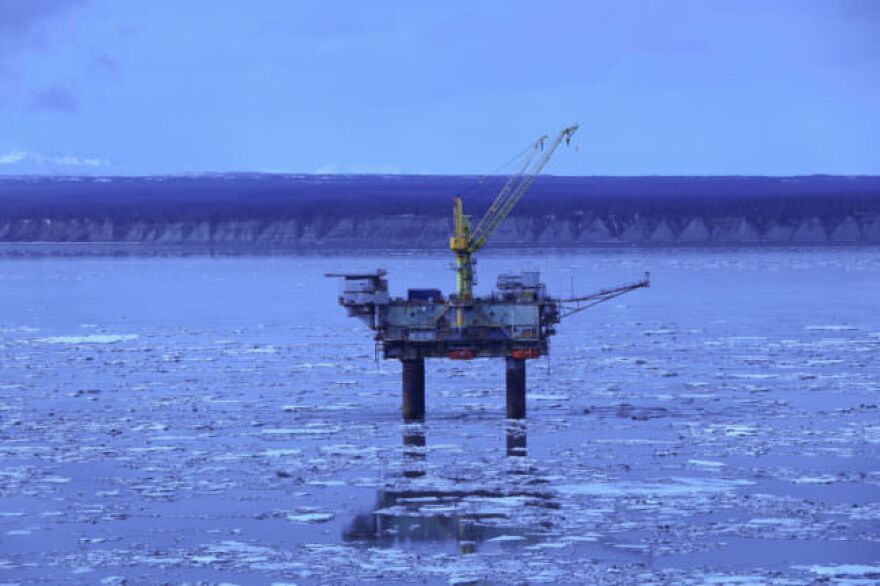Environmental groups are protesting the state's move to renew a federal permit that allows oil and gas producers to release a variety of pollutants into Cook Inlet.
This is the first time the state has issued the permit. Environmental groups say the state should move the oil and gas industry away from the practice, and those groups are also pushing back against the state raising the volume of oily wastewater producers are allowed to discharge.
Gerry Brown, who oversees the permitting process for the Alaska Department of Environmental Conservation, explains that the state permit for Cook Inlet oil and gas producers includes a number of discharge types. But treated oily wastewater from the drilling process, known as produced water, elicits the most concern.
"It is essentially the oily water that's treated in order to take oil out of the formation water. Then what's left is the treated wastewater that's discharged as produced water," Brown said. "That has been in the permit from the very start."
The permit would boost the amount of produced water oil and gas companies are able to dump by about 1 million gallons per day. Most of the increase would stem from a single oil platform operated by Cook Inlet Energy.
It's the first time the state agency has issued the permit for state waters since it asked to take over the process from the U.S. Environmental Protection Agency in 2012, citing that it wanted more control over all surface water discharge permits in the state. The EPA still issues the discharge permits for oil and gas operations in Cook Inlet's federal waters.
Under the permit, produced water and other discharges can be dumped into areas known as mixing zones. DEC said Cook Inlet's strong currents dilute discharges enough so the water can meet federal standards.
"So the mixing zone is a volume of water where they discharge – where they're allowed to mix with the ocean in order to meet our water quality criteria," Brown explained. " Because the treatment technologies available just can't get there at this time."
Brown said the permit also calls for larger mixing zones than in the past. It would cover all oil and gas producers in Cook Inlet
Cook Inlet is the only region of the state where DEC allows oil and gas producers to discharge wastewater and other pollutants. Cook Inletkeeper Director of Advocacy Bob Shavelson argues that mixing zones prevent adequate water quality monitoring and thinks the idea is a "toxic dumping loophole" that will harm northern Cook Inlet's lucrative commercial and sport fisheries.
"So imagine three miles, that's the area that they're allowed to mix their waste where you don't meet basic Clean Water Act Standards to protect fish and people and so forth," he added. "And so they're just going back with the Clean Water Act, which was meant to eliminate pollution to our waters. Here we're increasing it."
Shavelson and others want oil producers to re-inject wastewater and other pollutants back into wells after they're drilled, a more expensive option. Shavelson argues that the renewal of the discharge permit will lead to ever-increasing volumes of wastewater dumping.
"As oil fields age, the amount of water that's produced increases relative to the oil and gas that you get out. So you have more produced water, that's the oily water. So they have to discharge it into Cook Inlet or they can re-inject it into the formation."
Brown with DEC said it could take the agency over a month to sort through public comments, and it's unclear when it may issue a decision. It closed the public comment period for the permit last week.


